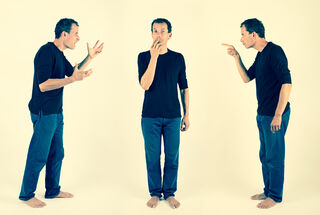Health
Changing the Habit of Self-Criticism
The habit of critical self-talk matters as much as what we say.
Posted November 4, 2022 Reviewed by Ekua Hagan
Key points
- Self-criticism is strongly associated with depression, anxiety, trauma, addictions, and eating disorders.
- The habitual behavior of self-critical thinking impacts depression and anxiety as much as the self-critical thoughts themselves.
- Practicing specific mental techniques can significantly change the habit of self-criticism.

Which aspect of self-criticism causes more distress: the content of your self-criticism, or the habit of criticizing yourself throughout the day?
Seeing yourself as lazy, fat, stupid, or unsuccessful—either with words or as a general attitude—can certainly cause a great deal of emotional pain. Self-criticism is positively linked with a range of mental health conditions, including depression, anxiety, eating disorders, posttraumatic stress disorder, addictions, and self-harm.
As a clinical psychologist, I’ve heard many patients describe intense self-criticism about different aspects of themselves. Self-criticism seems to make everything worse, as though it forms an extra layer of pain on top of other stressors and mental health difficulties.
When I first meet with self-critical patients, they often seem resigned to their self-criticism. “That’s just the way I am,” they tell me. “I’ve always been like that,” they’ll insist, as though it’s a pre-programmed, unchangeable feature, such as height or eye color.
However, self-criticism is influenced by family and cultural contexts, including emotional abuse, racial discrimination, and homophobia. The evidence shows that many of us internalize negative messages so that our own minds habitually perpetuate self-criticism. The research also indicates that self-criticism can be changed.
How the Habitual Nature of Self-Criticism Impacts Mental Health
What if the habit of self-criticism is just as important as the content of the self-critical thoughts themselves? When I was researching self-criticism for my new book, The Self-Talk Workout, I read a set of research studies that underscore the value of treating self-criticism as a powerful mental habit, rather than only addressing the substance of self-critical thoughts.
Researchers Bas Verplanken and colleagues highlight a few different features of self-criticism that bring its habitual quality into focus. These include the frequency with which you criticize yourself, the extent to which self-criticism happens automatically, the efficiency with which your mind leaps to criticize yourself in any difficult situation, and the degree to which self-criticism occurs outside of your intent, awareness, or control.
Verplanken et al. created a self-report measure called the Habit Index of Negative Thinking (HINT). Analyzing responses to the following questions, the research team assessed the degree to which participants engaged in self-critical thinking by having them respond to the following:
Thinking negatively about myself is something...
- I do frequently.
- I do automatically.
- I do unintentionally.
- That feels sort of natural to me.
- I do without further thinking.
- That would require mental effort to leave.
- I do every day.
- I start doing before I realize I’m doing it.
- I would find hard not to do.
- I don’t do on purpose.
- That’s typically "me."
- I have been doing for a long time. (Verplanken et al., p. 541)
The researchers found that levels of habitual self-criticism as measured by the HINT contributed to symptoms of depression and anxiety over a 9-month period in a sample of 1,102 respondents (641 women and 461 men). Self-criticism predicted depression and anxiety even beyond the content of the negative thoughts themselves, as measured by the Dysfunctional Attitude Scale, and even after accounting for work stress, home stress, age, and gender.
These results don’t tell us that the habit of self-criticism causes more mental health problems than the self-criticism itself, but rather that both aspects of self-criticism impact depression and anxiety. Perhaps it’s a bit like smoking: the smoking itself causes health problems, but the habit or addiction to smoking propagates the behavior.
How to Change the Habit of Self-Criticism
Awareness of default behaviors can be a valuable step toward changing habits, but awareness or intentions alone (“I should really be nicer to myself”), are unlikely to produce real change. Instead, the research indicates that people make significant changes in self-criticism from specific mental techniques that reduce self-judgment and promote self-compassion.
The term “self-compassion” means treating yourself in a friendly and caring manner, even during moments of difficulty or failure. Self-compassion is not the same as self-esteem, which involves evaluating yourself positively or negatively.
Mindfulness meditation and lovingkindness meditation are two specific approaches that decrease self-criticism. Both practices are concentration workouts because they train your mental attention away from habitual thoughts. These workouts might not seem particularly easy, or as though they work immediately, but the research evidence is strong that they reduce self-criticism over time.
Mindfulness meditation is not about clearing your mind, but rather the practice of noticing and reshaping your mental experience. You can start by tuning into the sensations of your breath, and then redirecting your attention back to the breath, for about 10 minutes or longer.
The goal is not to repress the thoughts that arise, but instead to return your attention back to the breath with as little self-criticism as possible (“My mind wandered, that’s OK, now back to the breath”). When you notice self-criticism about becoming distracted, simply handle it as you would any other thought (“There’s the self-criticism, that’s OK, back to the breath).”
Some people get discouraged at how much their minds wander but it’s that very pull towards the habit of self-criticism that repeated meditation can change through regular practice. In fact, reducing judgment seems to be a key mechanism explaining why mindfulness improves mental health.
Another approach that meaningfully reduces self-criticism is lovingkindness meditation (LKM). The practice involves several minutes of silently repeating phrases to yourself, such as, “May I be safe. May I be happy. May I be healthy. May I live with ease.”
My students sometimes say that repeating phrases feels strange or awkward at first but that after a few weeks of regular practice, they notice less self-criticism. Studies demonstrate that LKM significantly reduces self-criticism, posttraumatic stress disorder, and depression.
If it sounds hard to add five or ten minutes of practice to your day to change the habit of self-criticism, I encourage people to begin with a single breath: “Inhale, my friend; exhale, my friend.” One breath without self-criticism can be a starting point to shift your mental habits and build a relationship with yourself that is more friendly, encouraging, and compassionate.




